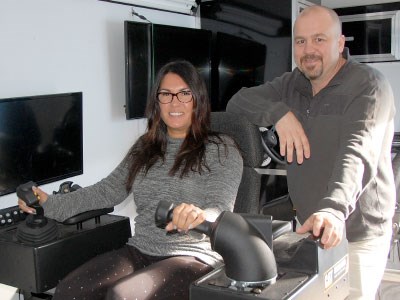Finding diamonds in the rough and eliminating obstacles to employment are what drives Paul Giles of Hardy Giles Consulting.
The co-owner of the five-employee Fort William First Nation-based company, who portray themselves as a group of “outside-the-box thinkers,” is expanding their expertise into pre-employment screening for forestry firms in northwestern Ontario.
He views the consultancy as a matchmaker to open doors for First Nation people, by identifying their untapped talents and connecting them with employers looking for competent and reliable workers.
“We try to match people to opportunities and break down barriers,” said Giles. “And build their confidence,” adds Melissa Hardy-Giles, his wife and business partner.
The company offers a wide range of work-readiness and certificate training programs. Performing heavy equipment operator assessments are the newest extension of that agenda.
A year ago, the company purchased Caterpillar-made heavy equipment simulators, with assistance from the Northern Ontario Heritage Fund, and have been hauling them by trailer to reserves across northwestern Ontario.
“We’re solution providers mainly for First Nation people,” said Paul. “That’s our passion. Overcome the oppressive barriers and knock down some of the disadvantages.”
Growing in the tiny northwestern Ontario town of Rainy River, Giles was an angry, troubled and frustrated kid, who found some kindred spirits in his disadvantaged First Nation and Métis friends.
It spurred his desire to pursue a degree in social work before entering the economic development field and eventually entrepreneurship in 2010.
The company’s modus operandi is to provide an avenue for Aboriginal people to chase their individual dreams, whatever that might be.
“We want to lead people toward finding their purpose in life,” said Paul, “and in finding their financial independence.”
In the beginning, they assisted Aboriginal communities and organizations with project management, strategic planning and human resources. They handled the holistic side too, with life skills training, self-esteem, goal-setting and team-building exercises.
Based on his workforce training experiences, Paul knew that mainstream, “assembly-line” instruction doesn’t always connect with First Nation participants.
“Something’s often lost in translation,” he said. “In a lot of traditional education systems, it’s not dream killer but it can become difficult for people who don’t thrive in a classroom environment.”
“They prefer hands-on (instruction), than a classroom setting,” said Melissa.
It planted the seed to acquire the simulator, which has proved to be a good measuring stick to evaluate mechanical aptitude and the requisite mindset needed to thrive in an industrial workplace.
The simulator spits out a summary report of the operator with tangible measurables, such as safety awareness, time on task, and fuel-burn rate.
“At a glance, you can see the quality of the operator,” said Paul, who mentions some smaller forestry operators, including a First Nation startup, have hired them to screen applicants. The data-supported reports, he said, guarantees finding the right employee.
“We’re like a risk reducer in that sense.”
The next step is assembling a skills database for communities and further evolving to become a recruitment services provider for forestry and mining companies, said Paul.
“Long term, we want to become a recognizable standard for operators. Provide something clean-cut with the integrity to find good operators. We want employers to trust us that they’re getting a level of skill.”




